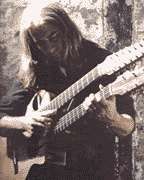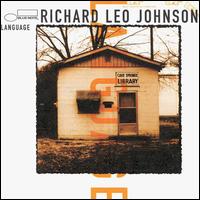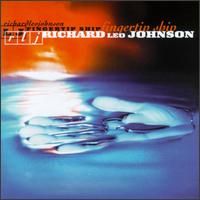

Courtesy of
Richard Leo Johnson


A FIRESIDE
CHAT WITH RICHARD LEO JOHNSON
I'm
not certain what the hell "new age" is and why on earth that
is a section at Tower Records, that miserable mantra has typecast Richard
Leo Johnson. Johnson who owes his development as a guitarist to no one
other than himself is beyond categorization, a mix of all his various
influences and interests, yet for the benefit of all those who buy an
album for one song they heard on the radio and two months later sell it
to a used CD store, he has been labeled "new age." Shame. Hopefully,
this adds some insight into his playing and in doing so will leave him
of such titles in the future. As always Chats are brought to you unedited
and in his own words.
FRED JUNG:
Let's start from the beginning.
RICHARD
LEO JOHNSON: I had a teacher, but I lost interest pretty quickly. He said
that I played too fast and that kind of thing. I did have a couple of
lessons from him and from that point on, basically, it has just been spending
a lot of time with the instrument by myself and teaching myself pretty
much how to play. I never really played in a band or anything like that.
One of the early guitar lessons had an assignment to learn a C major scale.
I was too busy trying to play as fast as I could and making noise on the
guitar and I didn't learn that lesson and the teacher scolded me and embarrassed
me in front of my friends and I was very traumatized by that and never
went back. I guess that is why in the process of that happening to me,
I just recoiled back into the privacy of my own imagination and just treated
the guitar that way.
FJ: Being self-taught allows for a certain freedoms.
RICHARD
LEO JOHNSON: I guess, for me, it was just a reaction to not having achieved
a certain goal that was set for me by somebody else and feeling belittled
and almost embarrassed by the fact that I didn't do what was expected
of me. The initial reaction, of course, was rejection and then from that
point beyond, the idea of embracing the open-endedness of what the potential
was, to spend that time with the instrument alone was very rewarding.
FJ: What attracted you to the guitar in particular?
RICHARD
LEO JOHNSON: First of all, I was fascinated by the fact that it was so
portable. I used to carry it around with me to different kinds of acoustical
environments and I liked the idea that it sounded different every place
that I took it. I never really played electric guitar. I had one for a
little while and it didn't feel right to me. There is a resonant quality
in your solar plexus that the acoustic guitar gives you that the electric
guitar doesn't, I guess, unless you stand real close to the amplifier
or something. I just was fascinated with the options and the way the tuning
keys were, when I looked at them, I basically saw them as options and
learned to tune the guitar like everyone else does, but I immediately
started finding that, well, the guitar that I had was very hard to play.
The action was really high and so I started to tune the guitar down to
lower tunings and turning the knobs and it was making it easier on my
fingers to play chords and stuff. Then I realized that turning the tuning
keys to different knobs created a whole series of different sound qualities.
It just opened up a whole other range of possibilities of how the guitar
could be treated. It is like it can be tempered so many different ways
without a whole lot of effort. It wasn't so static.
FJ: Influences?
RICHARD
LEO JOHNSON: When I first started out, I saw the Beatles on TV and that
was kind of interesting. The real turning point for me was when a friend
gave me a cassette tape that wasn't marked. He just gave it to me to listen
to. He was trying to play a trick on me. I was about thirteen at the time.
He had put a John McLaughlin record and a Leo Kottke record on the same
tape and it wasn't labeled. I thought it was one person playing those
two dramatically different styles. That was a turning point for me. It
blew my mind. It was John McLaughlin's The Inner Mounting Flame and Leo
Kottke's Greenhouse. A lot of it was band format. Both of those records
had some drums. It just blew my mind and I didn't know whether to kill
myself or just start practicing. I remember just sort of letting that
settle for a while and going into a long period of time trying to replicate
that moment thinking it was one person. Of course, later on, I found out
it was two.
FJ:
Let's touch on your debut for Blue Note, Fingertip Ship.
RICHARD
LEO JOHNSON: Fingertip Ship was a recording that basically Brian Baccus,
who is the head of A&R at Blue Note, told me that they wanted to make
a record that documented what I sound like when I play the guitar as a
solo musician. The Fingertip Ship is what you get when I do a live show.
FJ:
And the new release, Language?
RICHARD
LEO JOHNSON: The idea for Language was one that I had been knocking around
for a while and had been discussing with different people. The records
are totally dramatically different in that respect. The concept was that
I recorded the guitar part and I knew that somebody else was going to
play on the songs, but I didn't know who it was going to be and I invited
Brian to help me with the decision making of what kind of instrumentation
might work well with the different songs. So we had this list of artists
and added and subtracted from it. The risk involved with this record was
that none of the musicians heard what anybody else was going to do. They
just did their part on the songs and then we brought all of it together
at one time and listened to it and remarkably enough, it worked out really,
really well. It turned out really good. It was almost like they collaborated
behind my back or something. It is almost like the way pop records are
made. I just really left a lot of the decision making up to the artists.
Fred Jung is the Editor-In-Chief and who am I? I'm Spider-man. Comments?
Email
Him